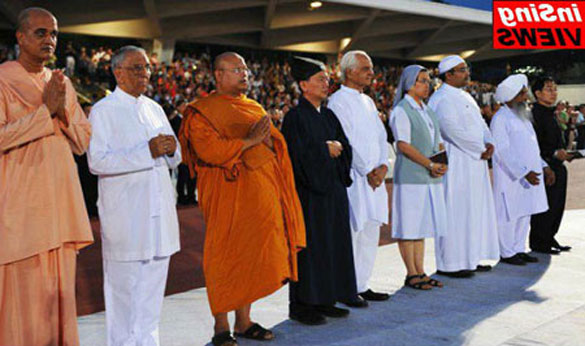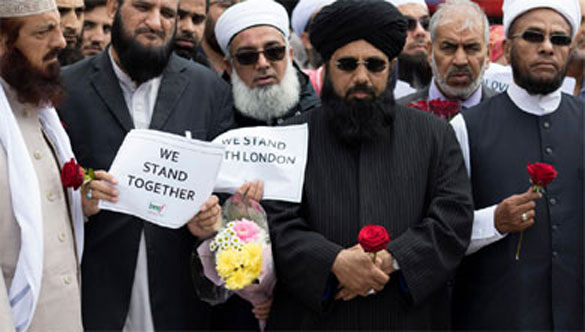We Need To Go Beyond the External Manifestations of Different Religions to Their Inner Essential Meaning

By Mujeeb Rahman
Kinaloor for New Age Islam
October 21,
2020
Recently, I
uploaded a video on my YouTube channel explaining the similarities in some
beliefs and customs in two religious traditions—Judaism and Islam. I made the
video in order to promote awareness of some of the things that these two
religions have in common. This fact is generally not known or appreciated,
because a sizeable section of the communities that identify with these two faiths
seems to be constantly in conflict with each other. I had hoped that
recognizing the similarities between these two faiths, and a third Semitic
religion—Christianity—which generally share the legacy of Abraham, would help
foster friendship and fraternity among those who claim to be their followers.
But the reactions the video elicited were just the opposite! Instead of viewing
similarities between Judaism and Islam as something positive, most of those who
watched the video and commented on it tried to make it a point of contention!

One
response made by many of those who commented on the video was that the Jews
were supposedly arch-enemies of the Muslims and that, therefore, Judaism and
Islam will always be at loggerheads. For such people, the similarities between
the two faiths did not seem to suggest the need for their adherents to come
closer at all.
A second
response to the similarities of the two religions that the video highlighted
was the claim that these similarities existed because they had allegedly been
borrowed by Islam from Judaism, a much earlier faith historically. For those
who held this view, as in the case of those who advocated the first view, the
commonalities between Islam and Judaism did not seem to be reason enough to
appreciate the need for inter-community harmony and interfaith understanding
between Jews and Muslims.
From this
experience I recognized the bitter truth that in the minds of a large section
of religionists, religion is often simply a sort of wrestling match, where one
argues and fights with others, seeking to defeat one’s opponents and win.
All
religions originated in special historical contexts. The common goal of all
religions is to lead people to the light and to inspire them to live in peace
and happiness. Despite differences in beliefs and practices, the ultimate goal
of religions is the wellbeing and liberation of human beings. Despite their
unique features, there are many factors that unite the religions. All religions
share common values that give meaning and beauty to human life. Love,
compassion and justice are important elements of all forms of genuine
spirituality.

As long as
religions are diverse, differences of opinion between them are natural. But the
need of the hour is not to exaggerate these differences. Instead, we need to
celebrate their similarities and uphold common values. Religions should not
fail to bring up human beings to the noble idea that all human beings are
sisters and brothers to each other.
What was
lost when religions became large crowds and crowds became large institutions
was the dynamic spirituality of religions. It is from spiritual tenderness that
all noble human feelings sprout. When that moisture dries up, it is replaced by
dryness and barrenness, arrogance and rivalry, very often in the name of God.
That is when the thought of ‘me’ and ‘mine’ alone being supposedly right
arises. When this happens, one refuses to accept even the possibility of other
realities. Instead of reforming themselves, religionists then seek to try to
defeat others. For them, religion becomes nothing more than a wrestling match,
aimed by a fervent desire to trounce the rest and be crowned the champion!
In all
religious communities, those individuals who claim to speak with authority for
their faith—as clerics, priests and so on—should set an example, in and through
their own personal life, of loving service and recognition of the essential
unity of all human beings. Unfortunately, however, often it is people who are
considered religious ‘leaders’ who are primarily responsible for hate and
conflict in the name of religion.
Many
religionists may behave rationally in other spheres but become emotionally
surcharged when it comes to religion. They simply do not want to understand
religion—their religion as well as others—with a cool mind, without the heavy
clutter of emotional baggage. This is what we see abounding on social media,
with terrible consequences for inter-community relations and social harmony.
We need to
go beyond the external manifestations of the different religions to their
inner, essential meaning. People of different faith backgrounds need to change
their preconceived notions of each other, which they can if they start talking
to, and with, each other and so get to know them as they truly are. But this
talking should not be limited just to so-called interfaith seminars and the
like, between supposed religious ‘experts’. Human beings live not in seminar
halls but in the streets of cities and in villages. Practical ways must be
devised to lead them to the recognition of the essential unity of all human
beings and, more than that, of the essential unity of all beings.
-----
Mujeeb Rahman Kinaloor is Chairman, Vakkam
Mawlavi Study Centre, Kozhikode. Journalist, Teacher and has seven books to his
credit as an author.
URL: https://newageislam.com/interfaith-dialogue/we-need-go-external-manifestations/d/123230
New Age Islam, Islam Online, Islamic Website, African
Muslim News, Arab
World News, South
Asia News, Indian
Muslim News, World
Muslim News, Women
in Islam, Islamic
Feminism, Arab
Women, Women
In Arab, Islamophobia
in America, Muslim
Women in West, Islam
Women and Feminism
